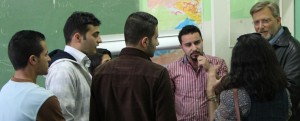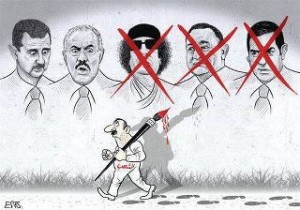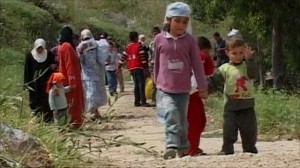Joint UC Berkeley Law, Election Administration Research Center —UC Davis Human Rights Initiative Preliminary Observation Report- Nagorno Karabakh Presidential Election, July 19, 2012
Date of Report: July 22, 2012
Group Composition and Method
The group arrived in Stepanakert, the capital city of the Nagorno Karabakh (NK) on Monday, July 18 and remained in NK throughout the election on July 19, and departed the NK on July 21.
Prior to the election, the group held a series of meetings with NK electoral commission officials, each of the three candidates for office, members of their staff, local human rights advocates, journalists and engaged in random discussions with citizens and likely voters.
On the day of the election, the group used a systematic research methodology based on a comprehensive survey questionnaire designed at the Election Administration Research Center, of the University of California, Berkeley School of Law, completing the survey form based on observing the election at 7 sites, including a pre-election visit to a voting center, and a return visit to one site. These observations included a range of voting centers in the capital, small villages and regional centers. Observations were made in three provinces: Stepanakert, Askeran, and Martuni,.
The observer team was present at a voting center at opening, returning to that same center for closing to observe the ballot counting and reporting procedures.
The team then followed ballots and reporting materials to the Stepanakert regional election center and observed final handling and recording of results and materials. We were the only observer team in NK that followed the entire process.
The day after the election members of the group conducted follow-up interviews with two members of the Central Election Commission (CEC), local human rights advocates, journalists, election observer members from other countries, and representatives of the second place candidate.
Group members:
Karin Mac Donald, Director, The Election Administration Research Center, University of California, Berkeley Law (Election and Monitoring Specialist)
Professor Keith David Watenpaugh, Director, Human Rights Initiative, University of California Davis (Cultural Expert, non-native Armenian speaker)
Professor Heghnar Zeitlian Watenpaugh, Affiliate Scholar, Human Rights Initiative, University of California, Davis (Cultural Expert, Armenian native-speaker)
Preliminary Observations
The group was very impressed with the professionalism, demeanor, dedication and seriousness of purpose at all levels of election administration, in particular that of local election boards.
We observed large numbers of women voters and that a considerable majority of women served as presidents and members of local election boards.
The teams noted with approval the uniformity of training and availability of reference materials that were widely used on the local level.
We also observed a great deal of uniformity in the implementation of the election process throughout the zone of monitoring.
The team was accompanied, at most times, by representatives of the NK government, who served as translators and facilitators, we appreciated the spirit of openness, access and collaboration before, during and after the election.
We also were satisfied with the manner in which spoiled ballots and ballots that were mismarked were handled according to established procedures as outlined in reference material provided by the CEC. This process was done effectively, transparently and efficiently.
As far as we could observe, the election procedures followed the NK election code.
The group observed that the training and preparation of candidate proxies (“Trusted People”) was inconsistent and seemed generally poor, preventing proxies from being able to fully advocate for the interests of their candidates within the bounds of established procedure.
Despite the presence of voters with physical disabilities, including the use of canes and wheelchairs, there was little if no formal provision made for independent access by people with physical disabilities to voting.
The group observed two occasions of what could constitute attempted voter intimidation. In addition, the team received first-hand reports of subtle and not-so-subtle forms of voter intimidation. The team observed one incident of inappropriate passive electioneering in a polling place.
The leading opposition candidate’s campaign alleged prior to the election in the Armenian press (15 June 2021) that government resources and personnel were being used by the incumbent’s campaign. Subsequent to the election in the candidate’s concession statement (20 July 2012) similar allegations were raised again, as well as in interviews with campaign staff.
We note that interaction between international monitor groups was not facilitated before and after the elections, creating a lost opportunity for collaboration and exchange of expertise. There was no formal mechanism for collecting the observations of international teams.
Preliminary Conclusion
We congratulate the people and election officials of the NK on an election that generally adhered to international standards.
We look forward to analyzing the enormous amount of qualitative and quantitative data we have collected and plan to issue a follow-up report with more specific recommendations. We believe that this election signals the probability that future elections in the NK will be more competitive. This may necessitate a reexamination of ballot security measures.
The degree of voter engagement, high voter turnout, the sophistication and acumen of the electorate, and the civic spirit of the voters suggests that the NK is creating a vibrant and vital democratic society.
One very important dimension of this election that we observed is that even the major losing candidate and his campaign, despite their concerns about fairness and irregularities, viewed this election as a critical step in the evolution of a fully democratic society. This same empowering sense of what the election meant was shared by a broad spectrum of NK society.
We look forward to working with the people of the NK to further strengthen their democratic institutions and provide any assistance that we can as they continue their journey in support of a vibrant, transparent, and free democracy.






